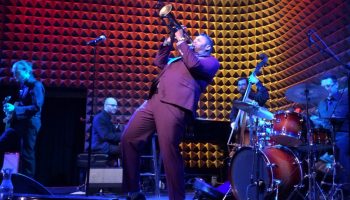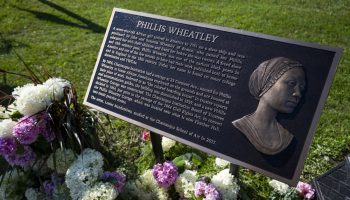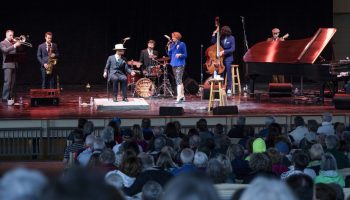Don’t call Turtle Island Quartet a crossover group.
“We’re not ‘crossing over,’ ” said founder and violinist David Balakrishnan. “We’re already there.”
Turtle Island will perform John Coltrane’s magnum opus, A Love Supreme, along with other jazz standards at 4 p.m. Monday in Elizabeth S. Lenna Hall.
String quartets, no matter what and where they play, are haunted by their 18th-century heritage. On their nights off from playing Carnegie Hall, string quartets are supposed to accompany weddings and fancy dinners.
Perhaps nobody knows that better than Balakrishnan.
“When the group was founded, we were really horrified by the term ‘crossover,’ ” Balakrishnan said. “We avoided it like the plague.”
The term “crossover” is problematic because it can go both ways. To some people, it’s a way for classical musicians to break into the mainstream. For others, it’s Barbra Streisand trying her best to sing French art song.
The bottom line for crossover, according to Balakrishnan, is the bottom line. Record companies want to sell records.
“In the past, the idea meant a classical musician playing something that’s cute and fun,” Balakrishnan said. “The purists would be insulted and the record company would be overjoyed.”
Individual players have come and gone, but Turtle Island has been performing for almost three decades. Throughout that time, the core premise of the group has stayed the same.
“It was formed around this idea of being able to play with the right accent and being grounded in the styles on which American music is based,” Balakrishnan said.
Every player in the group, without exception, must be trained in jazz and classical techniques.
“We don’t just have a couple people who can improvise a little bit,” Balakrishnan said. “All four players can play hardcore, bebop, and straight-ahead jazz.”
Hiring musicians who are native jazz players is what makes Turtle Island different from groups who transplant their classical sensibility into other genres.
“They don’t swing. Sorry!” Balakrishnan said.
That’s not to say it’s impossible for classical players to successfully explore other genres.
“Great musicians like Yo-Yo Ma have done it. Before him, it was Yehudi Menuhin,” Balakrishnan said.
Turtle Island even admires its main competitor, the Kronos Quartet.
“They’re so respectful of the style and they put so much attention into that. That’s why they’re so successful,” Balakrishnan said. “They come with game.”
Still, Turtle Island prefers to stay within what they know they can do well.
“We cover a wide range of styles, but we don’t go to places where we feel we can’t deliver,” Balakrishnan said.
The musicians have done well for themselves by sticking to what they know. Turtle Island won a Grammy for their recording of A Love Supreme. It was a grand coup. If the term “sacred music” applies to any jazz, it applies tenfold to Coltrane’s work.
“Love Supreme is like holy ground for jazz musicians, and not just because of the music,” Balakrishnan said. “It has this spiritual dimension that goes deep to the core of what we are as human beings.”
Coltrane, in his own way, “crossed over” to reach a level of expression previously reserved for other genres.
“He accessed that level the way the great European composers do,” Balakrishnan said. “It’s so symbolic of the way jazz can reach much deeper.”
Pulling off Coltrane with a string quartet presents a serious problem: there’s no rhythm section.
That means no drum solos, like the one that opens the third movement of A Love Supreme. It also means the players have to somehow create the rhythmic foundation on which jazz playing is built without hiring a drummer, a bassist, or a pianist.
“The most obvious choice is the cello because a cello is like a small version of a bass,” Balakrishnan said. “But most classical cello players don’t have any idea about how to play a jazz bass line.”
Fortunately, Turtle Island cellist Malcolm Parson does.
“He’s a monster bass player who’s playing the cello,” Balakrishnan said.
Parson uses bowing techniques borrowed from bluegrass and jazz to add a percussive element to his playing. For example, Parson can use the part of the bow closest to his right hand, which is heavier than the tip, to strike the strings. This method, called chop bowing, produces a crisp, drum-like sound. Parson essentially becomes the bassist and drummer of the quartet.
On the Coltrane record, the harmonic background for A Love Supreme was provided by pianist McCoy Tyner. To coordinate the job among Turtle Island’s four players, Balakrishnan had to notate the chord changes in detail.
“It’s almost like big band writing. There’s a lot more written out than you would have in a traditional jazz group,” Balakrishnan said. “Coltrane didn’t show up with a bunch of six-page charts.”
Even with all their effort, the group knows they can’t perfectly duplicate Coltrane’s classic quartet.
“You’re not going to sound like Elvin Jones. You’re not going to sound like McCoy Tyner,” Balakrishnan said. “It’s a string quartet, dude.”





